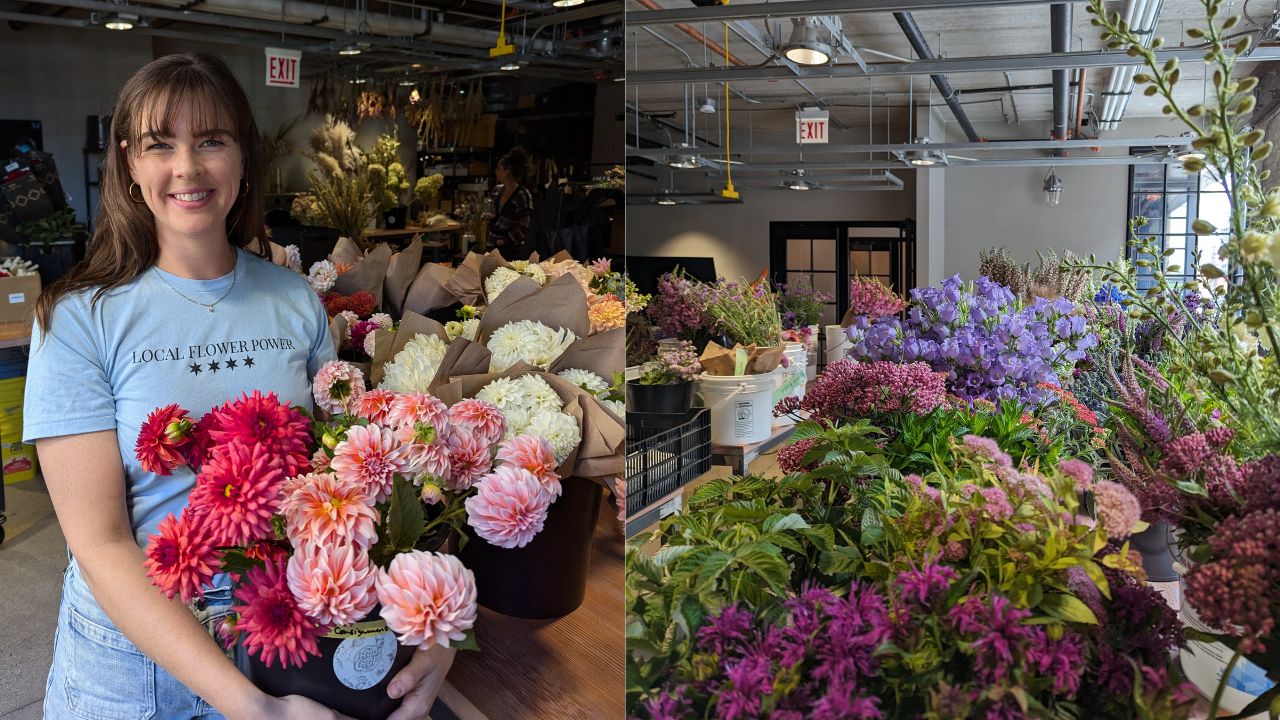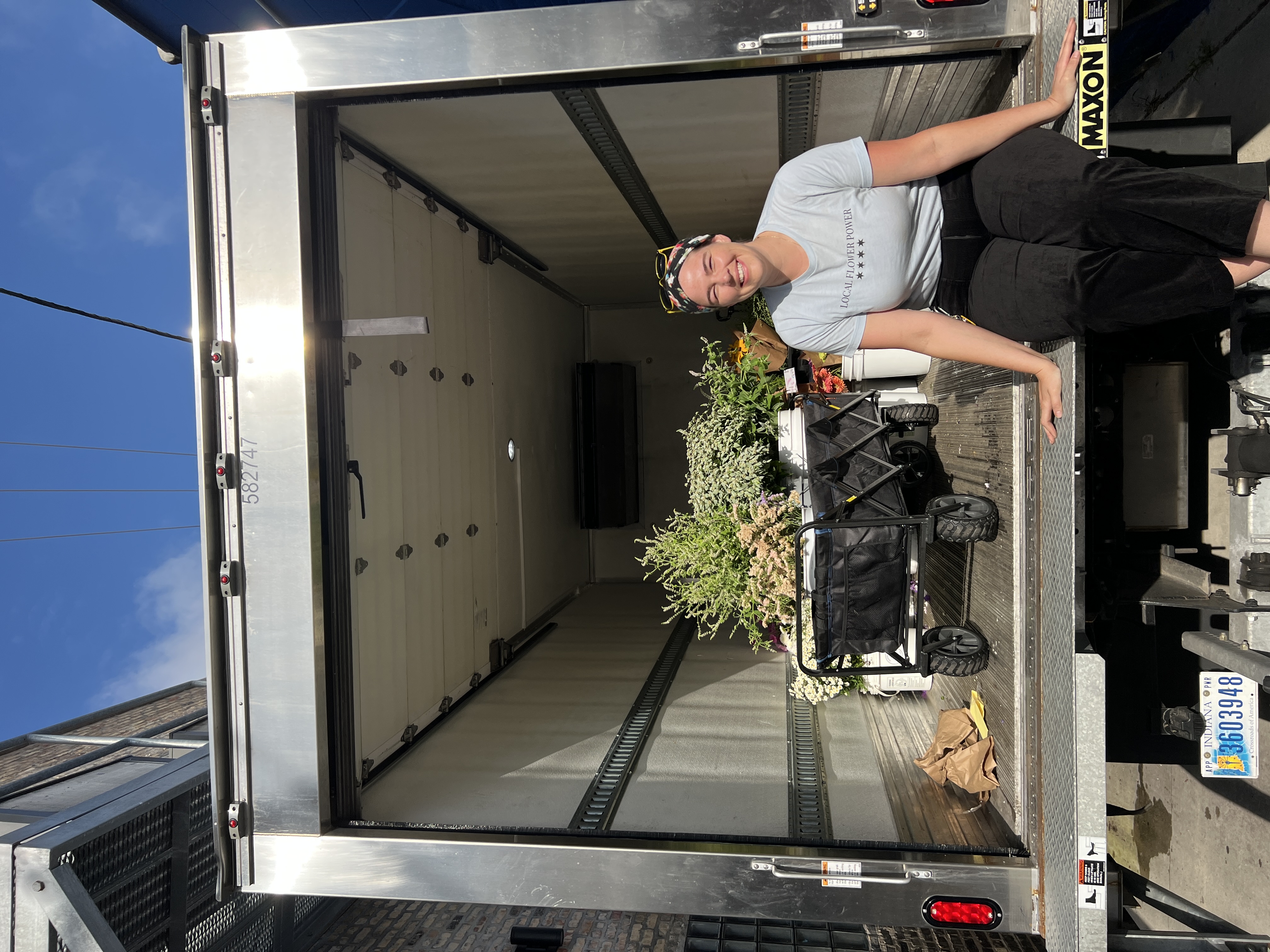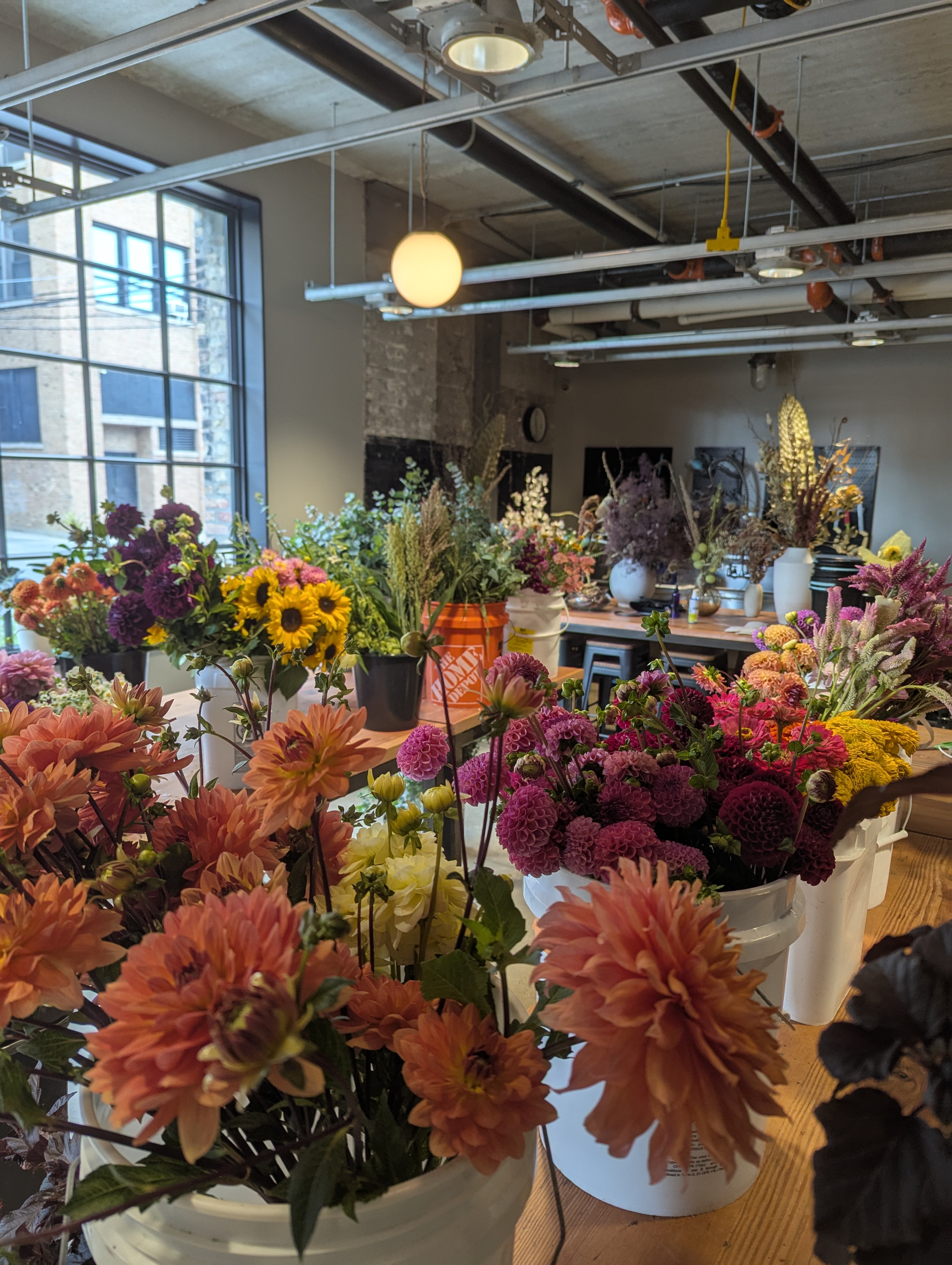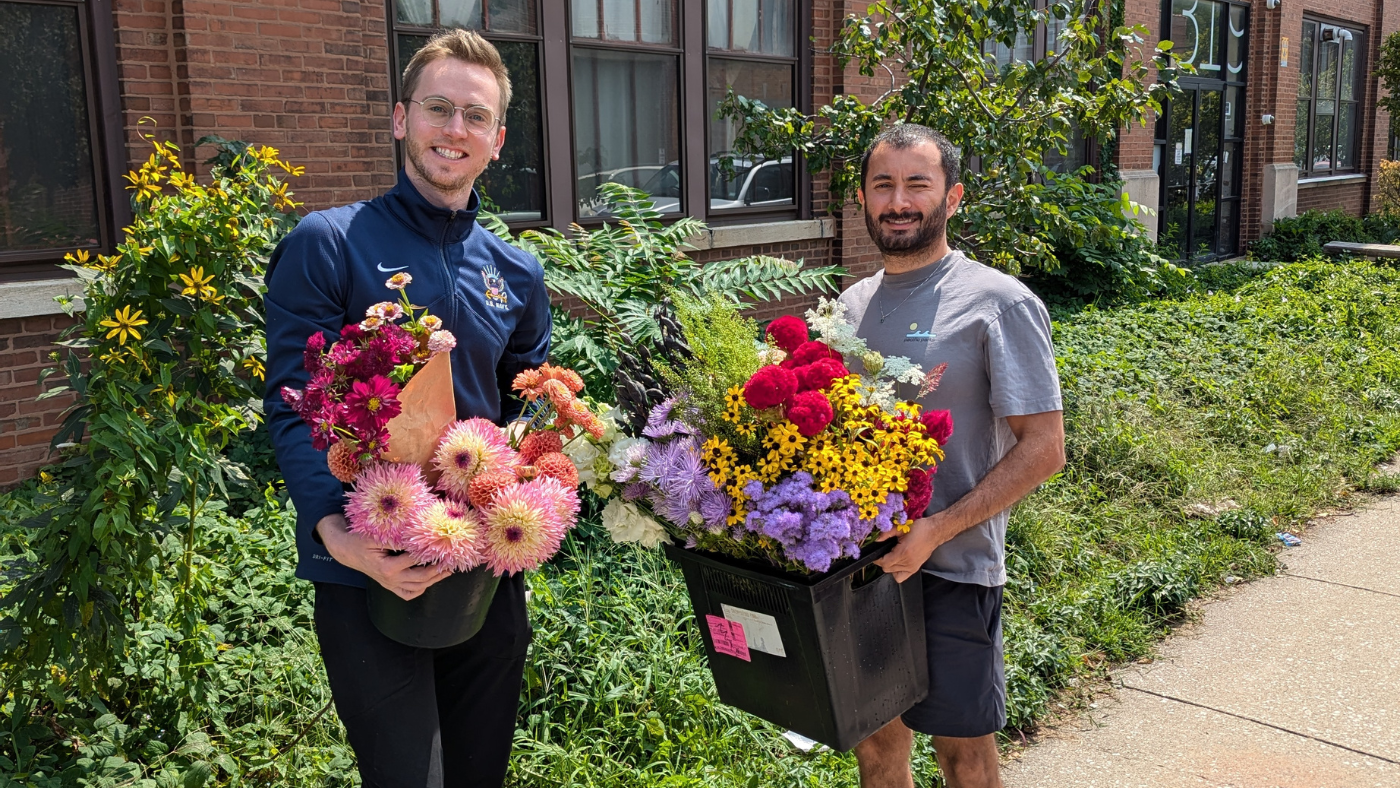Free Workshop | Farm Marketing Meets AI: Learn ChatGPT Workflows for Busy Farmers
.webp)
+1 (855) 699 1026

When Sarah founded the Chicago Flower Market three years ago, she was simply trying to buy bulk flowers locally and discovered there was nowhere to do so.
“I wanted to buy bulk flowers, and that didn’t exist yet in Chicago,” she says. “So I started cold-calling growers and asking if they wanted me to sell their flowers. Thankfully, some of them said yes.”
What began as a few phone calls grew into a wholesale flower hub connecting Midwestern growers to event florists and flower shops across Chicago.
“We sell wholesale cut flowers to florists and regular people,” Sarah explains. “Most of our volume actually goes through event florists, weddings, showers, and big events. They’re our bread and butter.”
Sarah’s mission goes beyond selling flowers. She’s passionate about celebrating local growers and sharing the stories behind every stem.
“A lot of flowers in the U.S. are imported from Colombia, Kenya, or the Netherlands,” she says. “It’s hard to tell the story of a flower from beginning to end. I love working with our Midwest growers because I can drive three hours and visit their farms. They’re employing people in their communities, moms, part-timers, folks who need flexible work.”
Today, the Chicago Flower Market partners with 12 growers, from micro-growers in the city to large-scale farms across Illinois, Michigan, and Wisconsin. “Some are growing right in downtown Chicago,” Sarah smiles. “It’s amazing.”
As the Chicago Flower Market grew, Sarah found herself juggling spreadsheets, product lists, and multiple communication channels between growers and florists. She needed a system that could scale and give her flexibility and control.
“When it came time to find a better system to manage my growing hub, I wanted more control and customization,” Sarah says. “I needed to decide how my products appeared to customers and how my storefront functioned, especially during busy ordering weeks.”
Before Local Line, Sarah was using another flower-specific platform, Gather Flora. While she appreciated what it offered early on, it didn’t quite fit her business model as the hub evolved.
“They were focused more on the grower-to-traditional wholesaler side of things,” she explains. “That’s great for farms selling directly, but I needed something that could manage the full distribution process, from multiple growers to dozens of florists. Local Line felt built for how I sell, from growers to florists.”

Switching software in the middle of a busy season could have been a logistical nightmare, but for Sarah, the transition to Local Line was smooth, fast, and surprisingly personal.
“Switching mid-season was scary,” she admits. “But the onboarding experience was incredible. The team walked me through every step, and within days I was up and running.”
From the start, Sarah says the support and responsiveness set Local Line apart. “From day one, I’ve been amazed by Local Line’s ability to hear my feedback and immediately implement change,” she says. “I’ve worked in corporate America with systems that are slow and rigid. This is the opposite. Sometimes I’d give feedback and see the change made that same day. It’s wild.”
That open communication helped her quickly and confidently fine-tune her storefront.
“I felt like I had a partner in the process, not just a software provider,” Sarah explains. “They genuinely wanted to make sure my hub succeeded.”
“The customer service is unbelievable,” she says. “You can talk to someone directly and actually see results. I’ve never experienced that level of support with any other platform.”
For Sarah, that personal connection is what made the biggest difference. “When you’re running a hub, you don’t have time to wait days for help,” she says. “Knowing I can get an answer right away, or even see my suggestion turned into a new feature, makes me feel supported every step of the way.”

Once she made the switch, Sarah quickly discovered how much smoother her weekly operations could be with Local Line. What used to take hours of manual work now happens in one place.
“Local Line completely changed how I manage my order cycle,” she says. “My customers can order two weeks out, and I’m constantly updating product availability and categories as new blooms come in.”
For a business that works with 12 growers across multiple states, keeping inventory accurate is no small task. “Every week brings something new, peonies one week, dahlias the next, and I need to make sure my florists are seeing exactly what’s fresh and available,” Sarah explains. “With Local Line, I can make those changes instantly and trust that my storefront always reflects what’s in season.”
But what she values most are Local Line’s reporting and data tools that give her clear visibility into her business. “I love being able to get a snapshot of how I’m doing for the week, by product, type, or category, without crunching numbers,” she says. “It saves me hours every week.”
Those insights help her make smarter decisions for both her growers and her customers. “If I notice a certain flower is selling out fast, I can communicate that to the growers right away,” she says. “And if something isn’t moving, I know to adjust pricing or bundle it differently next time.”
By simplifying her systems and surfacing actionable data, Sarah can operate a smooth, data-driven process. “I used to spend my evenings tracking sales and payouts,” she says. “Now, I just pull a report. It’s that easy.”
“My sales year-over-year have doubled,” she says proudly. “And my customers’ ordering time has decreased; they’re so much more efficient when shopping.”
That improvement in customer experience has been a key driver of her growth. Competing with large national wholesalers means every minute counts for florists who are already pressed for time. “My customers are often working on tight deadlines for weddings and events,” Sarah explains. “They might only have an hour between deliveries or design days to place their orders. Local Line makes it quick and easy for them to log in, find what they need, and check out without stress.”
The simplicity and speed of the new system have also helped build stronger relationships. “When my florists have a smooth ordering process, they’re more likely to come back week after week,” she says. “It builds trust. They know I’m organized, and that consistency matters.”
With LocalPay’s lower credit card fees, Sarah can keep costs predictable while maintaining transparent pricing for her buyers. “Other platforms don’t cap subscription fees as sales volume increases,” she explains. “With Local Line, it’s stable. That helps me budget better and keeps my florists happy because there aren’t surprise charges.”
Coordinating logistics across 12 growers in three states can be complex, but Sarah has developed an efficient, collaborative system that keeps her regional supply chain running smoothly.
“Our growers meet at a central hub, and we send a truck to pick everything up,” she says. “They pack by product type, and when the flowers arrive in Chicago, we sort by order.”
It’s a process that ensures freshness, efficiency, and accuracy every week. Each grower bundles stems by variety, all the anemones together, all the dahlias together, so when the truck arrives, Sarah’s team can quickly unpack and rebuild each florist’s order. “It’s very similar to how food hubs operate,” she explains. “Everything is handled in water, so the flowers arrive hydrated and healthy. That makes a huge difference in quality.”
As her hub has grown, Sarah has also reimagined what logistics collaboration can look like. Rather than investing in a delivery van right away, she’s found smart ways to share resources with others in the local food and farm network.
“There’s a food hub in Northwest Indiana with a refrigerated Sprinter van,” she says. “I pay them to pick up my Michigan and Indiana flowers and bring them to Chicago. It’s been a win-win. They get more use out of their van, and I get reliable, temperature-controlled transportation without the overhead.”
“Next year, I’d love to have my own van and even help food hubs with their loads,” she says. “We’re all driving the same routes, why not help each other?”

After several seasons of running a busy wholesale flower hub, Sarah has learned a lot about what it takes to build a system that truly works. Her advice to others in the industry is straightforward: plan ahead, stay organized, and choose tools that grow with you.
“Get all your products uploaded in the off-season,” she says. “Don’t wait! It’ll save you and your growers so much time during the busy months. Your growers are depending on you to have systems in place. When you plan ahead, you’re not just saving yourself time, you’re giving your partners a smoother, more predictable season.”
She also emphasizes the importance of choosing technology that supports long-term growth rather than short-term fixes. “As a hub, you need flexibility,” she says. “You’re dealing with multiple suppliers, fluctuating inventory, and customers who need clarity and speed. Having a platform that can scale with you makes all the difference.”
And when it comes to comparing farm e-commerce options, Sarah doesn’t hesitate.
“There’s really no match in the industry, fee-wise, compared to Local Line,” she says. “You can sell as much as you want, and your costs stay the same. If you want to scale, keep your costs fixed. Local Line makes that possible.”
To her, it’s not just about the features. “Local Line isn’t just a tool; it’s a team that listens and evolves with us,” she adds. “They understand the realities of running a hub, and that support gives me the confidence to keep growing.”
For flower farmers, wholesalers, and market managers alike, Sarah’s approach is a reminder that success starts with simplicity. “Plan ahead, stay consistent, and find systems that make your life easier,” she says. “If it’s not simple for you, it won’t be simple for your customers.”
For Sarah, the Chicago Flower Market is more than a business; it’s a community effort built on relationships and beauty.
“I love that Local Line works for our micro-growers and our large-scale growers,” she says. “It’s a huge asset to roll out across all my customers.”
With her sales doubling, her systems streamlined, and her growers thriving, it’s safe to say the Chicago Flower Market is gearing up for an even stronger season next year.
👉 Ready to grow your floral business with Local Line?
Book a demo to see how our tools can help you streamline operations, delight customers, and scale your sales, season after season.

.webp)
.webp)